If you’re working on your online marketing, you likely understand how important Google reviews for lawyers can be. These reviews are feedback that your clients leave on your Law Firm’s Google Business Profile (formerly known as Google My Business).
Your law firm’s Google reviews are important for many reasons that we’ll explore in this article. But I’ll tell you this right away: attorneys that are looking to build a strong online presence shouldn’t leave Google reviews out of the mix.
It is a very important element in your law firm’s SEO efforts and reputation management plan. In this article, I’ll explain to you the most important things you need to know about Google reviews for lawyers.
Some topics we’ll explore include:
- Why are Google reviews important?
- Do Google reviews improve your law firm’s SEO?
- How many reviews does your law firm need?
- How to reply to Google reviews
- 5 tips to get more Google reviews for your law firm
Let’s begin!
Why Are Google Reviews Important?
Google reviews are important for lawyers because, as a ranking factor, they improve a law firm’s visibility in the local map-pack. Additionally, since they allow past clients to share their experiences with the firm, reviews help build credibility and trust with new potential clients.
Many people still struggle to see the importance of growing the number of Google reviews for their law firm’s GMB profiles. However, these reviews will certainly be read by future potential clients. In fact, 56% of legal consumers said that online reviews play a major role in their decision to hire a law firm.
This shouldn’t come as a surprise, since reviews can give your potential clients a good idea of what to expect when working with your law firm by reading other people’s experience.
If they find positive reviews, they’re likely to feel more confident about giving you their business.
As a consumer yourself, you probably value the transparency of online reviews, whether you’re shopping online or hiring a local service business.
Your law firm’s Google reviews can also give you a solid idea of how well your practice is performing and if you are falling short in certain areas.
For example, if one of your firm’s practice areas receives more negative reviews than others, there may be something you can improve in that part of your practice to make your clients happier.
Do Google Reviews Improve your Law Firm’s SEO?
According to a Moz study, review signals ranked #3 on the list of the top 8 factors for Local Search Results and #7 for Localized Organic (Web) Search Results. So, yes, Google reviews can help a law firm’s SEO significantly.
Google reviews for lawyers not only help build credibility with potential clients, but also with Google itself. That’s why having a good quantity and quality of reviews can improve your online visibility in your target location.
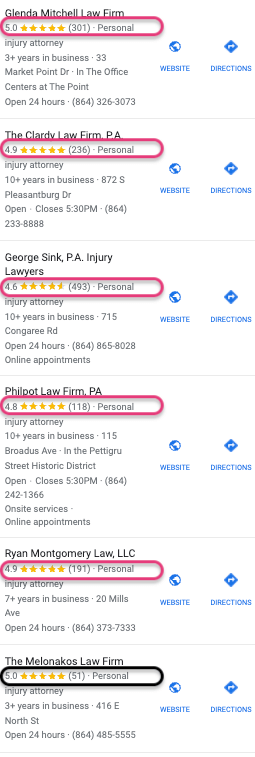
Now, getting more reviews is great, but ‘with great power comes great responsibility’. What I mean is that you should garner reviews responsibly. Google is smart, so avoid getting a high volume of reviews as a one-time project. While it might work in the short term, slow and steady wins the race here.
Work on putting a system in place that will get you reviews repeatedly and consistently. At Zahavian Legal Marketing, we help law firms we work with to put automated systems in place that generate Google reviews like clockwork.
Pro Tip: Having your main keywords in the body of the reviews can help Google understand more about the services your law firm provides, which can also help you rank better.
How many reviews does your law firm need?
Just like many other strategies, the number of reviews attorneys need depends on the specific law firm’s SEO goals and the market competition. So, in short, this number can vary from law firm to law firm.
However, we do have a simple process that will help you calculate how many you need if you want to be competitive in your local market. Here is what you can do to determine the number of Google reviews your law firm needs:
Set a Goal for # of Reviews & Rating Based on your Local Competitors in 3 Steps
- To start, do a search for your primary keyword (e.g. “car accident lawyer san diego”, “divorce lawyer new york”, etc).
- Record the top 3 competitors that are shown on page 1 of map results in Google. Make sure you include their names, number of reviews and average rating.
- Determine the average number of reviews for the top 3 competitors and identify the highest average rating of the 3 profiles.
Where are you compared to the top 3?
Ideally, you should aim to have your firm’s GMB review metrics in the same ballpark as these profiles. Look to generate the average number of reviews and the highest average rating you got in step 3.
For example, let’s say that your top 3 competitors have the following review stats as shown in this table:
| Total Reviews | Average Rating | |
| Competitor 1 | 187 | 4.5 |
| Competitor 2 | 120 | 4.8 |
| Competitor 3 | 134 | 4.7 |
Based on this data, you should achieve an average rating of 4.8 (the highest among your competitors) and collect the number of reviews needed to reach 147 (the average number of reviews that the top 3 profiles have). So, if you already have 20 reviews, you’ll need to get 127 more.
Here are some tips you can follow once you have defined your metrics:
- Determine the campaign deadline: how much time do you need to gather those reviews? Set a realistic and healthy deadline for this task. And, more importantly, stick to it! Let’s say 18 months for our example.
- Establish your monthly review quota: identify the number of reviews you need to generate on a monthly basis to reach your number of reviews within your deadline. In our example, this would look like 133/18 = 7.4 reviews (7-8 reviews per month).
- Identify your submission rate: this is the percentage of clients that will give you a review. Unfortunately, not all of them do. A realistic benchmark to set is 25% of the clients you ask. The submission rate does vary by practice area and the way you ask for it, but 1 in 4 is a good general estimate.
- Calculate the monthly request quota: this is the number of emails you need to send to get a review. You get this number dividing the monthly review quota by the submission rate. In this example, that is 7.4/25% = 29.6 requests per month. That means that you need to send 30 emails to past and current clients to generate 7-8 reviews every 30 days.
- Adjust for your Second Campaign: If you calculated your review goals based on the competitors (as we described above), then you should reevaluate the competition at the end of your first campaign. So, after 18 months, check back on your top competitors and see how their stats have changed. Make your calculations and adjust your campaign to reach your new goals.
Pro Tip: Getting Google reviews is a consistent ongoing natural process. Don’t get all the reviews at once and then stop. If you get a flood of new reviews in a short period of time, especially if you currently just have a few, Google may see this action as unnatural.
How to Reply to Google Reviews
Thank your clients for reviewing your business on Google as soon as possible. Thank them for their feedback on your business as well as for the pleasure of working with them. When responding to negative reviews, apologize and address the client’s concerns. If possible, try to offer a solution to the problem.
Although many attorneys overlook this task, replying to your law firm’s Google reviews is actually important and helpful for your SEO. Responding to your reviews shows both your clients and Google that you care about their feedback and your customer service.
A lot of Google My Business profiles get negative reviews. It’s normal. In fact, 92% of 400 respondents said that they will still consider hiring a law firm that has negative reviews. The key is what you do about it.
Responding to positive reviews is also important, so make sure you take the time to address these reviews as well. If you’re not sure about what to respond, here are some examples of how other lawyers respond to both their negative and positive reviews:
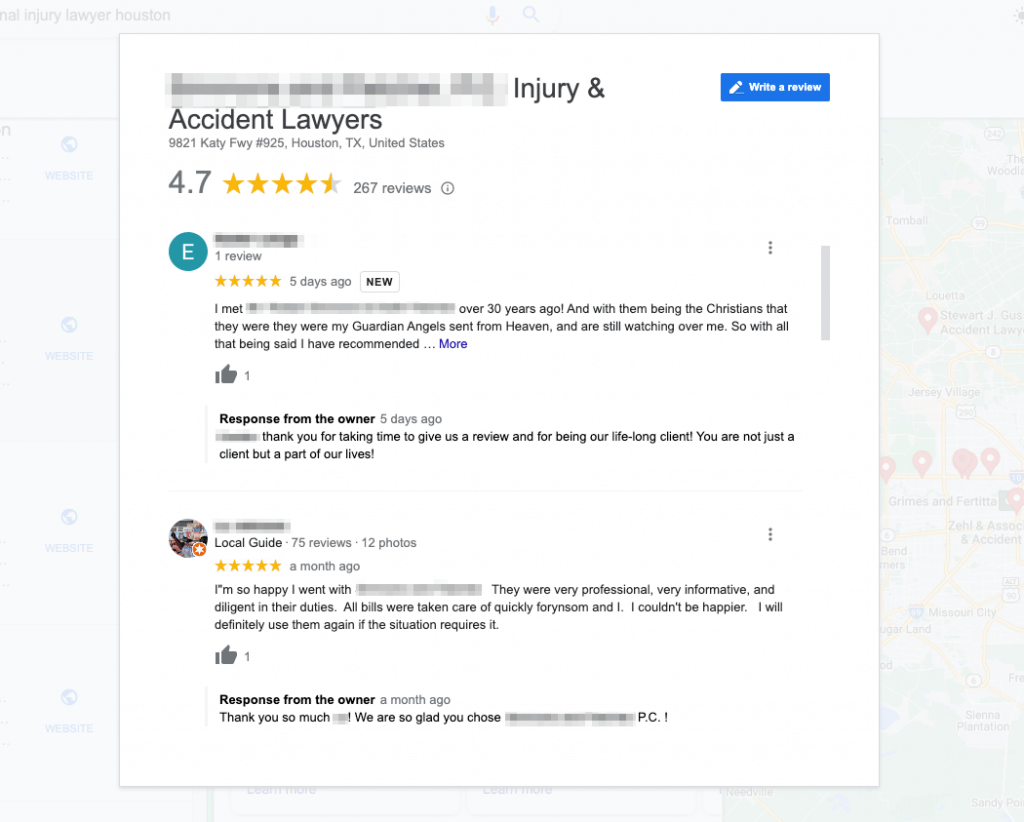
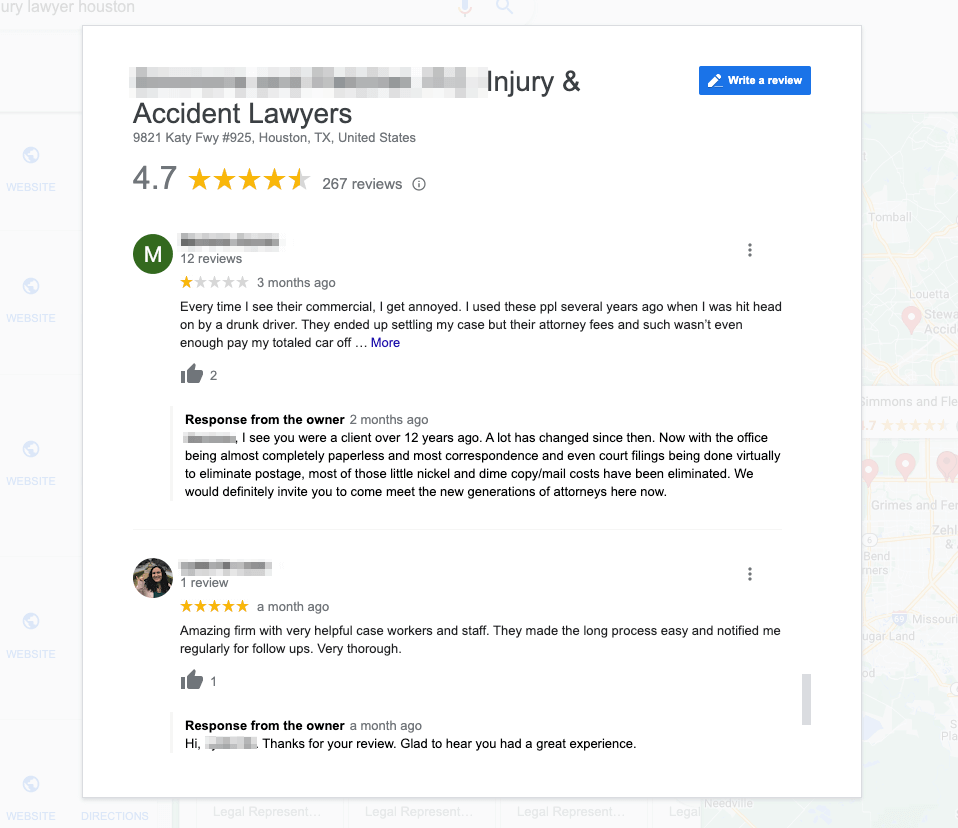
5 Tips to Get More Google Reviews for Your Law Firm
Now that you understand how important it is to get a consistent flow of reviews to your law firm’s Google Business Profiles, let’s see some strategies that you can implement to get more of them.
1. Put in place a review collection system
The best moment to ask for a review is when the client’s case has been successfully resolved. This is because the clients’ experience is fresh in their minds. If you still don’t have a collection system in place, you should build one around this moment of the client’s journey.
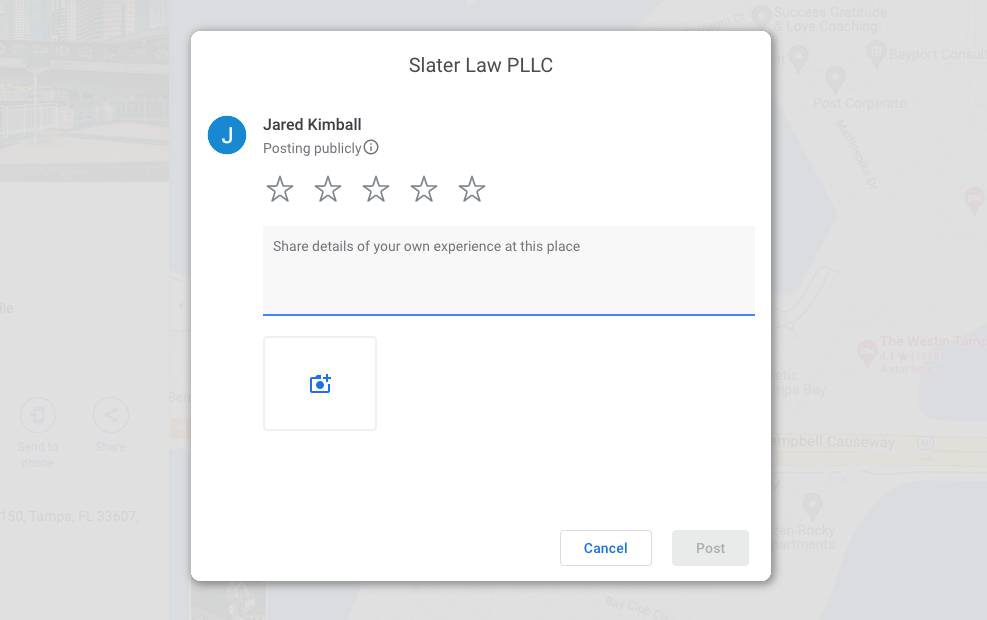
It can be as simple as sending a follow up email with a link to your Google Business Profile and paragraph where you request their feedback. You can actually get a special link for your GMB profile which will present the user with the review page for your business, making it super easy for your clients to leave a review.
Add a page on your website that contains the links to the profiles you want your clients to review.
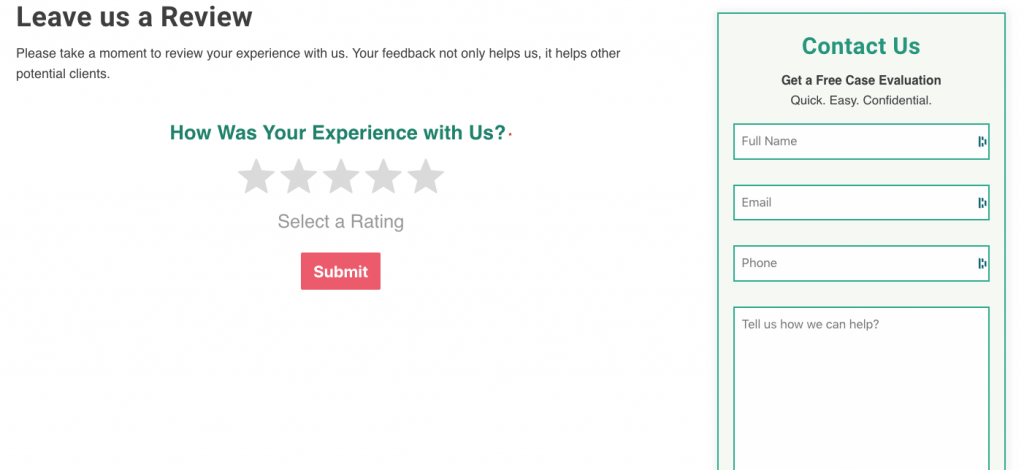
Page 1 of 2: Gauge client experience with preliminary star rating.
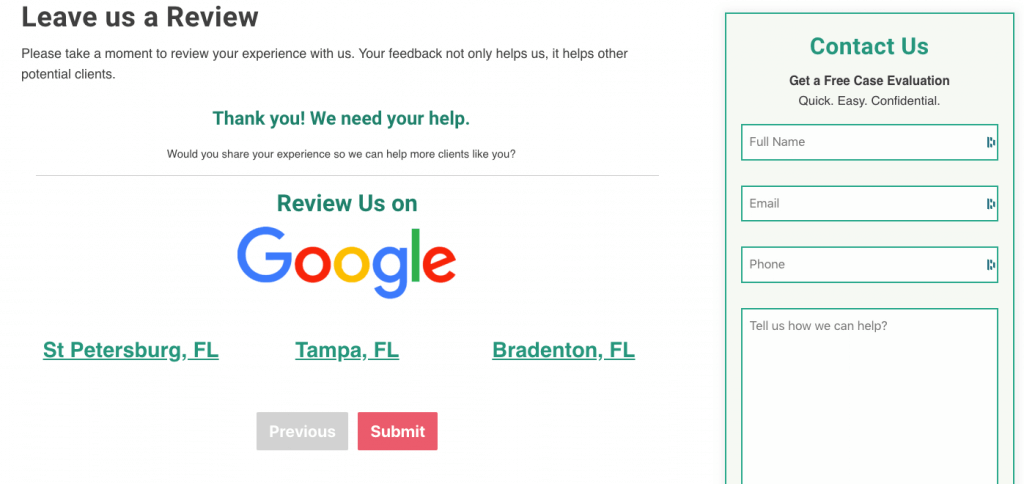
Page 2 of 2: Show links to leave a Google Review if client gave a preliminary 5-star rating on page 1.
You can either include the link to this page on the follow up email or have a button on the website’s footer so people can go directly to it.
No matter which option you choose, the key is to have a system that you can consistently follow.
2. Guide your clients
For many of us, leaving a review is difficult because we don’t know what to say, even if the experience was good. This may be also happening to some of your clients. To help your clients overcome this “writer’s block”, you can provide them with a list of tips or guiding questions to complete their Google review.
Here are some questions that you can adapt to your own process:
- What legal issue were you experiencing that led you to hire our law firm?
- How was your experience working with us throughout the process?
- After working with us, did you get the results you were looking for?
As you can see, the previous questions are framed in a way that helps your clients share their experience from start to finish. Additionally, they also give your clients a good idea about the keywords they should use in their review (remember that keywords are good). Make sure that your questions and any guidance you give to clients adheres to your bar rules.
3. Use business cards and marketing materials
Back in the day, business cards were used to provide your law firm’s contact information. However, you can tweak business cards to make them more relevant to your digital marketing strategy.
For example, you can use them to request reviews. To do it, you can simply include a short link to your GMB profile or, better yet, include a QR-code to your profile that people can scan with their phone.
On top of providing your contact information in case they ever need you again, your QR-code will help them find your profile. Don’t forget to include an attractive call to action such as “Your feedback is important for us. Leave us a review!”.
4. Reach out to your past clients
All happy former clients are a good source of Google reviews for your law firm. If you’re about to start your reviews campaign, these are the people that you want to reach first. To do so, start an email campaign where you ask them for their feedback.
If you’re not using software to collect reviews, don’t forget to include a link to the profile you want them to review.
5. Automate reviews with a CRM or law practice software
Nowadays, many things can be automated. Asking for reviews is no exception. Whether you use Clio, MyCase or another cloud-based law practice management system, you can likely automate the review collection process, save you and your staff precious time and maximize results.
What these software suites do for you is send a review request email when a client’s matter is closed in your system. So, forget about preparing all those monthly email requests yourself.
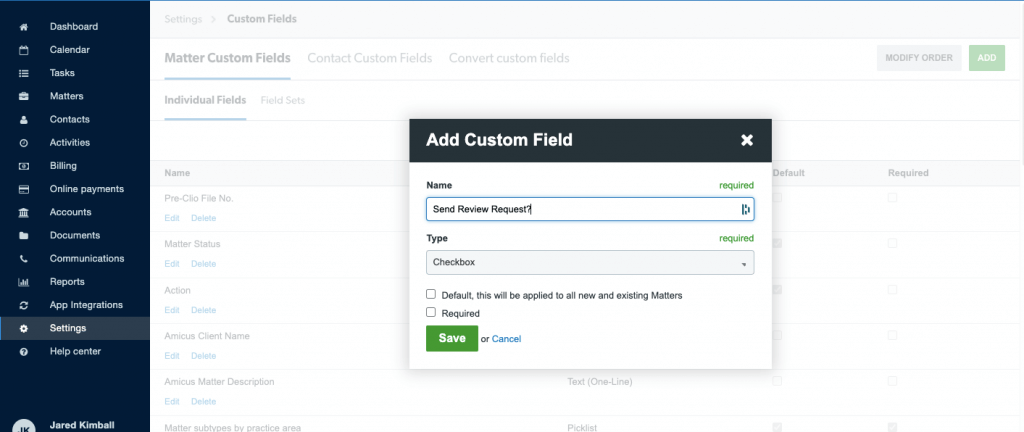
In most of the cases, you may be able to add a custom field, either in your law firm practice suite or a tag in your CRM, to indicate whether you believe the client is happy with your services or not. This can help you filter and control which clients receive the review requests, further protecting your reputation.
If you’re able to build this automation, the software will only reach clients that are likely to leave a good review on Google, which is great to improve the average rating that we discussed before.
Conclusion
As discussed in this article, Google reviews are an important part of building your online presence since they can actually help your law firm’s SEO efforts. It’s also critical for establishing a strong reputation management system. If you want to help your potential clients find you online and get more of your best cases, book a consultation with me and let’s talk about what we can do for you.


